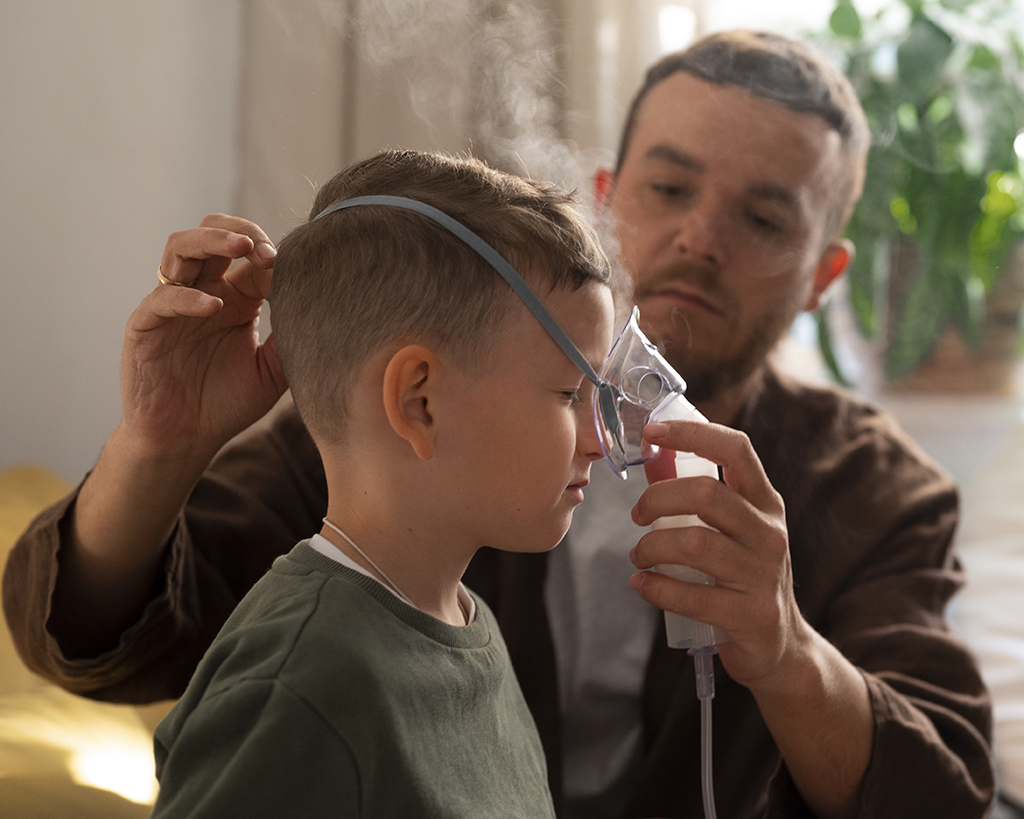Asthma in Children: Symptoms, Triggers, and Management
Asthma in Children: Symptoms, Triggers, and Management

Symptoms
- Coughing: Persistent coughing, especially at night or early in the morning, is a common symptom.
- Wheezing: A whistling sound during breathing is indicative of asthma.
- Shortness of Breath: Difficulty breathing or rapid breathing can be alarming signs.
- Chest Tightness: A sensation of tightness or pressure in the chest.
- Frequent Respiratory Infections: Children with asthma may experience more frequent colds and respiratory infections.
Triggers
- Air Pollution: High levels of air pollution, particularly in urban areas, can exacerbate asthma symptoms.
- Allergens: Pollen, dust mites, pet dander, and mold are common allergens that can trigger asthma.
- Indoor Pollution: Smoke from cooking with biomass fuels, incense sticks, and mosquito coils can irritate the airways.
- Weather Changes: Sudden changes in weather, especially during the monsoon season, can trigger asthma attacks.
- Infections: Respiratory infections, such as the common cold and flu,can worsen asthma symptoms.
- Physical Activity: Exercise, particularly in cold and dry air, can induce asthma symptoms.
- Stress and Emotions: Emotional stress and anxiety can also trigger asthma attacks.
Management
- Medication: It helps to reduce inflammation inside the airways and provide relief from symptoms. Always take medications as prescribed by your doctor.
- Avoiding Triggers:
- Air Quality: Monitor air quality levels and avoid outdoor activities when pollution levels are high.
- Indoor Environment: Use air purifiers, keep the home free of dust, and avoid using smoke-producing items indoors.
- Allergen Control: Use allergen-proof mattress and pillow covers and keep pets out of the bedroom.
- Education and Support: Educate the child, family members, and caregivers about asthma. This includes understanding how to use inhalers correctly, recognizing early signs of an asthma attack, and knowing when to seek medical help.

Conclusion
2. Mayo Clinic. "Childhood Asthma" https://www.mayoclinic.org/diseases-conditions/childhood-asthma/symptoms-causes/syc-20351507 accessed on 3rd August 2024 .
3.Global Initiative for Asthma (GINA) 2024 guidelines. https://ginasthma.org/2024-report/ accessed on 3 rd August 2024.
Get a Call Back
Categories
- Life Style Modification
- Cardiac
Health Blogs
The Benefits of Early Dinners: A Blend of Tradition and Science
The Benefits of Early Dinners: A Blend of Tradition and Science The Benefits of Early Dinners: A Blend of Tradition and Science In today’s fast-paced world, meal timing often
Kitchen Cures: Healing the Natural Way with Grandma’s Wisdom
Kitchen Cures: Healing the Natural Way with Grandma’s Wisdom Kitchen Cures: Healing the Natural Way with Grandma’s Wisdom Who doesn’t love quick, easy solutions to nagging he
Why Eating Nuts Before Meals is a Smart Choice
Why Eating Nuts Before Meals is a Smart Choice Why Eating Nuts Before Meals is a Smart Choice Adding a handful of nuts to the diet, especially before meals, can provide several hea
The Surprising Secret to Coffee’s Heart-Healthy Benefits: It is All About Timing
The Surprising Secret to Coffee’s Heart-Healthy Benefits: It is All About Timing The Surprising Secret to Coffee’s Heart-Healthy Benefits: It is All About Timing For many, the
5 Simple Morning Habits for a Healthier Start to the Year
5 Simple Morning Habits for a Healthier Start to the Year 5 Simple Morning Habits for a Healthier Start to the Year A new year offers a fresh opportunity to embrace healthier habit
Type 2 Diabetes and Mental Health: The Connection
Type 2 Diabetes and Mental Health: The Connection Type 2 Diabetes and Mental Health: The Connection Type 2 diabetes mellitus (T2DM) is a chronic condition affecting millions worldw
Is Sugar Really the Enemy? Unpacking Diabetes Myths
Is Sugar Really the Enemy? Unpacking Diabetes Myths Is Sugar Really the Enemy? Unpacking Diabetes Myths Diabetes is a growing public health concern worldwide, with type 2 diabetes
Tailoring the Dose of Exercise for Effective Glycemic Management in Type 2 Diabetes
Tailoring the Dose of Exercise for Effective Glycemic Management in Type 2 Diabetes Tailoring the Dose of Exercise for Effective Glycemic Management in Type 2 Diabetes Type 2 diabe
Ganesh Chaturthi and Diabetes: A Balancing Act
Ganesh Chaturthi and Diabetes: A Balancing Act Ganesh Chaturthi and Diabetes: A Balancing Act Ganesh Chaturthi, a vibrant and beloved Indian festival celebrated with great enthusia
Asthma in Children: Symptoms, Triggers, and Management
Asthma in Children: Symptoms, Triggers, and Management Asthma in Children: Symptoms, Triggers, and Management Asthma is a significant health concern among children in India, with i
Heart-Healthy Diet: Foods to Include and Avoid
Heart-Healthy Diet: Foods to Include and Avoid Heart-Healthy Diet: Foods to Include and Avoid India’s traditional diet is often heavy on carbohydrates, high-fat dairy product
Can I Donate Blood if I’m Diabetic?
Can I Donate Blood if I’m Diabetic? Can I Donate Blood if I’m Diabetic? If you’re diabetic, you may wonder whether you can donate blood. The good news is that inmany
Top Foods for Managing High Blood Pressure
Top Foods for Managing High Blood Pressure Top Foods for Managing High Blood Pressure High blood pressure is a common condition that affects millions of people worldwide. If left u
Loneliness and Diabetes: How Social Isolation Raises Your Risk
Loneliness and Diabetes: How Social Isolation Raises Your Risk Loneliness is a mental health problem that has been proven to have a significant impact on quality of life and health
Navigating Winter with Asthma in India: Tips for a Breath-Friendly Season
Navigating Winter with Asthma in India: Tips for a Breath-Friendly Season As winter sets in across India, individuals with asthma face unique challenges in managing their respirato
What is the optimal level of low-density lipoprotein (LDL) cholesterol for individuals living with heart disease?
What is the optimal level of low-density lipoprotein (LDL) cholesterol for individuals living with heart disease? LDL is considered as “bad” cholesterol as it accumulates in th
Diwali Delights: Navigating Healthy Celebration with 10 Essential Tips
Diwali Delights: Navigating Healthy Celebration with 10 Essential Tips Diwali, the festival of lights, is a time of joy, togetherness, and of course, indulgence in delicious sweets
Coping with COPD: Tips for Living Well with Chronic Obstructive Pulmonary Disease
Coping with COPD: Tips for Living Well with Chronic Obstructive Pulmonary Disease Chronic Obstructive Pulmonary Disease (COPD) is a chronic respiratory condition that can significa
How to live a healthy life after cancer?
How to live a healthy life after cancer? Cancer is definitely a debilitating disease that compromises our life’s quality and length of survival.The experience with cancer is uniq
Managing Glucose and Stress in Women with Type 2 Diabetes
Managing Glucose and Stress in Women with Type 2 Diabetes: The Power of Aerobic Exercise and Deep Breathing Diabetes is a type of metabolic disease. It has a strong connection with
Safe and Effective Exercises for Asthma Management
Safe and Effective Exercises for Asthma Management Safe and Effective Exercises for Asthma Management Asthma is a chronic lung condition that affects the airways, making it difficu






















